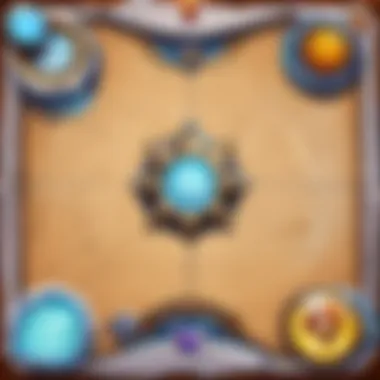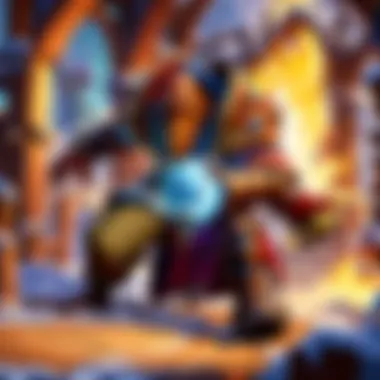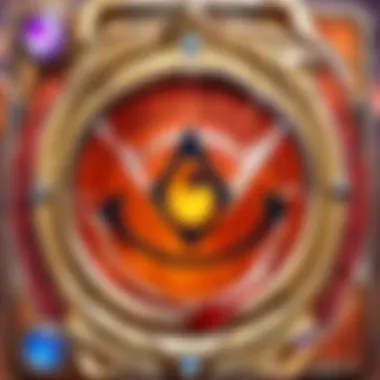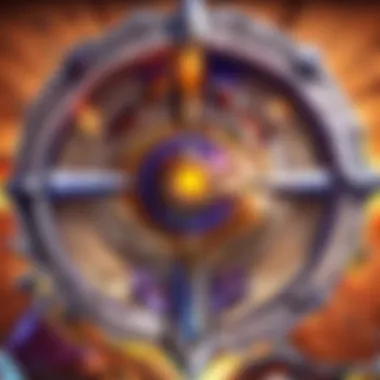Challenge Your Friends: Mastering Hearthstone Rivalries


Intro
Challenging friends in Hearthstone can be an enriching experience, combining both the strategic nuances of gameplay and the social dynamics of friendly rivalry. The game has matured considerably and offers diverse play styles, making each match unique. In this article, we will explore various aspects of competitive play with friends, focusing on strategies, opponent behaviors, and enhancing overall gameplay experience. Understanding how to effectively challenge friends not only improves individual skills but also cultivates a more engaging atmosphere among players.
Game Updates and Patches
Overview of the Latest Game Updates and Patches
Hearthstone continuously evolves with regular updates and patches. These changes can significantly affect competitive play, especially when playing against friends. Familiarity with the latest updates can provide a strategic edge. Recent patches have adjusted card balances, introducing fresh mechanics that can alter the dynamics of deck building and gameplay.
Detailed Breakdown of Changes and Its Impact on Gameplay
Every game update comes with a set of patch notes. Players should keep an eye on these to understand how different cards are impacted. For instance, if a popular card receives a nerf, it might prompt players to pivot their strategies. Conversely, the introduction of new cards can create exciting opportunities for innovative deck compositions.
Analysis of New Cards and Mechanics Introduced
With each expansion, Hearthstone introduces new cards and mechanics that can affect the current meta. It's crucial to explore how these elements can synergize with existing ones. Analyzing these changes helps players adapt their strategies when challenging friends. The ability to create unexpected deck combos can lead to memorable matchups.
Deck Strategies and Meta Analysis
Top Deck Recommendations for Different Play Styles and Skill Levels
Building a competitive deck is key when challenging friends. Whether you prefer aggressive or control-oriented strategies, knowing which decks excel can elevate your game. Here are some recommendations:
- Aggro Decks: Focus on fast-paced cards for quick victories.
- Control Decks: Prioritize long-term strategies that outlast opponents.
- Combo Decks: Look for synergies that can lead to one-shot wins.
Insight into the Current Meta and Popular Deck Archetypes
Understanding the current meta is vital. Popular archetypes often dictate how players build their decks. If Control Warrior is prevalent, bringing in a mirror match often leads to stalemate scenarios. Adapting your choices to counter the common archetypes can be a game-changer when competing with friends.
Strategies for Countering Popular Decks and Tech Choices
Countering is an essential aspect of competitive play. Knowing the typical strategies employed by friends can provide you with the tools necessary to gain an advantage. For instance, if your friend often plays a mid-range deck, aggro or faster decks can be effective counters. Include diverse tech cards in your deck to adjust to various challenges.
Card Reviews and Set Reviews
In-Depth Reviews of New Cards and Their Potential Impact on the Meta
Every new set introduces cards that can dramatically change gameplay. Reviewing these cards helps players identify those that are viable options for their decks. Analytical insights into new cards allow gamers to predict shifts in gameplay styles and metas.
Evaluations of Card Synergies Within Different Deck Archetypes
Card synergies can work wonders in any deck when the right combinations are used. Evaluating cards within their respective archetypes allows players to maximize effectiveness. Players should scrutinize not just individual cards but how they function collectively.
Set Reviews Focusing on Value, Versatility, and Competitive Viability
When new sets drop, understanding their overall value and competitive impact is essential. Players should assess the versatility of cards, considering factors like mana costs and abilities. A well-rounded set can provide ample options for various strategies, appealing to a broad range of players.
Player Guides and Tips
Beginner's Guides to Understanding Core Game Mechanics and Strategies
For newcomers, grasping gameplay mechanics can enhance experience significantly. Understanding concepts like mana management and board control sets the foundation for improving skill level.
Advanced Tips for Improving Gameplay and Decision-Making
Experienced players should focus on refining their decision-making processes. Adapting your play style to different opponents is crucial. Rather than sticking to a single strategy, transitioning between aggressive and defensive play can confuse friends and enhance your winning chances.
Arena Drafting Strategies and Arena-Specific Gameplay Tips
The arena presents its own challenges. Here, players should master the art of drafting by maintaining awareness of potential card synergies and the rarity of available cards. Anticipating opponent choices also adds a layer of complexity to successful arena play.
Prelude to Hearthstone Challenges


In exploring the realm of Hearthstone, the significance of challenge arises both as a way to engage with friends and as a tool for personal growth within the game. Each challenge serves as an opportunity to refine skills and deepen understanding of both game mechanics and psychological elements at play. By initiating challenges, players do not only seek to prove their abilities but also to cultivate bonds and enhance the overall playing experience.
Engaging friends in Hearthstone challenges offers numerous benefits. Firstly, it fosters a sense of community and camaraderie that can amplify the enjoyment of the game. Secondly, challenges provide a platform for players to experiment with new strategies and decks in a safe environment. Lastly, they encourage critical thinking and problem-solving, as players must adapt to the unique tendencies and styles of their opponents.
Despite seeming straightforward, setting up friendly competitions involves various considerations. One must consider the skill level of both parties, preferences in gameplay, and how to maintain the fun factor amidst rivalry. Whether it's a casual match or a more structured tournament, understanding these aspects can significantly elevate the gaming experience for all involved.
The Essence of Competition in Hearthstone
Competition in Hearthstone goes beyond winning or losing. It embodies the spirit of skill development, tactical acumen, and emotional resilience. Each match serves as a barometer for a player’s growth and offers a unique learning opportunity. As players adapt to different decks and strategies, they develop a deeper appreciation for the game. The thrill of competing against friends can enhance the excitement of the match.
Friend versus friend dynamics adds an extra layer of complexity. Players often know each other’s tendencies yet can still be surprised by unexpected moves. This back-and-forth not only hones skills but also reinforces friendships through shared experiences and memories. In this sense, competition becomes a crucible for both individual and collective improvement within the gaming community.
Why Challenge Friends?
Challenging friends in Hearthstone has multifaceted advantages. One primary reason is the opportunity to learn in an informal setting. Unlike ranked matches where the stakes might feel higher, playing against friends allows for risk-taking, enabling players to innovate with their gameplay without the pressure that often accompanies competitive ladders. Furthermore, this creates a low-pressure environment to explore new decks and strategies that might otherwise be overlooked in more formal play.
Moreover, these challenges act as social catalysts. They create moments of interaction, banter, and competition that can strengthen bonds between players. The discussions that arise after a match, whether congratulating a good play or analyzing a misstep, foster a deeper understanding and connection among friends.
Lastly, playing against friends helps to calibrate competitive spirit. It teaches players how to handle losses with grace and celebrate victories humbly. Because the relationship is central, players are incentivized to maintain a positive atmosphere, promoting healthy competition that enriches the overall gaming experience.
"Challenging friends in Hearthstone enhances not just your skill set, but also your connection to the game and each other."
Through thoughtful and strategic challenges, players can push each other to new heights while enjoying the journey along the way.
Understanding the Game Dynamics
Understanding the dynamics of Hearthstone is crucial for both new and experienced players. This section aims to delve into the mechanics that govern gameplay, highlighting how they influence competitive interactions. Knowing these elements allows players to make informed strategic choices and enhance their chances of success when challenging friends.
Game Mechanics Overview
The game mechanics in Hearthstone are intricate yet accessible. Each match consists of turns, where players draw cards, summon minions, and cast spells. Understanding the following mechanics can significantly elevate your gameplay:
- Mana System: Each player starts with one mana crystal and gains an additional crystal each turn up to a maximum of ten. Efficient mana usage is essential for pacing your strategy.
- Card Types: Cards fall into several categories: minions, spells, weapons, and secrets. Each has unique attributes that can change the flow of a match.
- Hero Powers: Every class has a specific hero power that provides unique advantages. Understanding your hero's strengths can shift the game in your favor.
Mastering these mechanics provides a solid foundation for playing the game effectively and facing challenges from friends.
Player Skill Levels and Match Outcomes
Player skill levels significantly impact match outcomes. The disparity in experience between opponents can create a varied competitive landscape. Here are some considerations:
- Skill Recognition: Recognizing a friend's skill level can help tailor your challenges. If you constantly challenge a friend less skilled than you, the matches may become one-sided, leading to frustration.
- Learning Curve: Players at different levels experience different learning curves. More experienced players can afford to teach strategies while still engaging in competitive play.
- Matchmaking Systems: Hearthstone employs matchmaking algorithms to pair players based on skill. Understanding how these systems work can help set up matches that are exciting and fair.
In short, acknowledging the skill levels of competing players informs the choice of challenges, increasing the relevance of each match.
Starting a Challenge
Starting a challenge is a critical phase in Hearthstone, as the initial steps set the tone for both the pre-game excitement and the competitive integrity of the match. The significance of this aspect lies in the fact that successfully navigating the beginning stages can greatly enhance the overall experience for both players involved.
When beginning a challenge, it is important to consider the purpose behind the match. Is it purely for fun, or is there an underlying desire to test one's skills? Understanding this can help in selecting the right approach and attitude. Furthermore, initiating a challenge can also influences the social dynamics of friendship. A friendly but determined spirit should always be maintained to avoid any potential frictions that may occur due to the competitive atmosphere.
Key Points to Consider
- The context of the challenge plays a vital role.
- Determine specific goals, whether they be improvement or enjoyment.
- Maintain respectful interaction throughout the process.
In summary, starting a challenge lays the groundwork for the entirety of the game. A relaxed yet competitive environment can lead to not only better gameplay but also to more enjoyable interactions overall.
Selecting the Right Opponent
Choosing the right opponent is paramount in the Hearthstone challenge. While facing off against friends can bring a sense of closeness, uneven matchups may dilute the gaming experience. Look for opponents whose skill levels are comparable. This balance encourages a more entertaining and fair contest.
An additional consideration is the personality of the opponent. Some players might thrive under pressure, while others may become frustrated. Being aware of these personal characteristics allows for a more harmonious interaction.
Selecting an appropriate opponent greatly enhances the quality of the match and contributes to a robust competitive environment.
Here are some pointers for selecting the right opponent:


- Assess skill levels by reviewing past match results.
- Determine shared interests in terms of playstyle and approach.
- Maintain a positive rapport to ensure the game remains enjoyable for both parties.
Ultimately, the aim should be to foster both growth and fun within the competitive framework.
Setting Up the Match
Once the opponent is chosen, setting up the match is the next logical step. This process involves confirming details such as the time, platform, and any specific rules or conditions that may govern the game. Having these parameters laid out can eliminate confusion and ensure a smooth experience.
Communication is crucial during this phase. Engaging in clear discussions about expectations and preferences can prevent misunderstandings. For instance, deciding whether to use a specific format or focusing on a particular deck type can help align both players' expectations.
Here are some important aspects to address while setting up the match:
- Agree on a common time that suits both players.
- Choose the right platform for gameplay, such as Battle.net.
- Clarify rules regarding card usage, deck limits, or any other conditions.
With everything established, the foundation for an engaging Hearthstone challenge is secured. Clear setup processes contribute to an enjoyable and competitive match, where both opponents can focus wholly on their skills and strategies.
Strategies for Success
Navigating competitive dynamics in Hearthstone requires a strategic mindset. Success in matches against friends depends on understanding not just the game mechanics but also the psychological and behavioral aspects of your opponents. Tailoring your approach can lead to more engaging game experiences and potentially win outcomes. This section dives deep into three areas that can enhance your competitive edge: tailoring your decks for your opponent, analyzing their patterns, and employing psychological tactics.
Tailoring Decks for Your Opponent
One of the most effective strategies is to tailor your deck according to what you know about your opponent. Each player has their own style. Input of knowledge about how they like to play adds an extra layer to your core strategy. For instance, if your friend often plays aggressive decks, consider including cards that counter rush strategies.
Key elements to consider when tailoring your deck:
- Card Synergies: Select cards that work well together. Cards that build on each other can create powerful board states.
- Counter Mechanics: Know the popular strategies of your opponent and build your deck with cards that can negate their strengths.
- Flexible Options: Include alternative plays to adapt to changing situations in the match.
This approach requires adaptation, not just on deck creation but also during play. Understanding your opponent’s tendencies can change your line of play significantly.
Analyzing Opponent Patterns
Behavioral analysis can provide a significant edge over your rival. You can derive patterns based on previous matches, which can help in predicting what your opponent might do next. Analyzing your opponent’s play style will offer important insights.
Some effective methods to analyze patterns are:
- Watch Previous Matches: Reviewing recorded games or replays can highlight important habits and pressing decisions made by your opponent.
- Take Notes: Keeping a log of your friends' games can help you spot recurring moves or strategies.
- Recognize Card Preferences: Be aware of the cards your opponent often chooses. Those habits can inform your strategy.
By knowing these patterns, you can prepare and counteract their moves with precision, leading to a more favorable outcome.
Psychological Warfare in Hearthstone
Psychological tactics play a crucial role in competitive gameplay. Minding the mental state of your opponent can be just as important as having a strong deck. Employing mind games can unsettle opponents and turn the tide in your favor.
Here are a few tactical considerations:
- Bluffing: Sometimes, showing hesitation or attempting to feign confusion can throw off your opponent’s rhythm, making them second-guess their decisions.
- Resource Management: Develop a game flow that creates tension by managing your resources openly. Look vulnerable but create traps.
- Anticipate Tilt: Observe emotional responses to play. Understanding when an opponent tilts or gets frustrated can be useful. This can affect their decision-making overall.
Combining these strategies can lead not only to enhanced performance but can also create interesting dynamics in your matches. Understand friends as opponents help everyone to enjoy and respect Hearthstone's competitive nature, leading to better gaming experiences.
Evaluating Performance
Evaluating performance in Hearthstone is critical for understanding how competitive challenges unfold and how players can adapt their strategies for success. This section focuses on the critical aspects of performance evaluation, including tracking wins and losses and conducting post-match analysis. By closely examining these elements, players can refine their skills and improve their overall gameplay experience.
Tracking Wins and Losses
Tracking wins and losses is a foundational practice for any competitive player. It allows you to quantify your performance over time, offering insights into trends that may not be immediately obvious. Keeping a record of your match outcomes equips you with the necessary data to assess your progress as a player. For example, if you notice a high number of losses against a specific opponent or deck type, this might indicate areas in which you need further study or practice.
Consider maintaining a simple log where you can note the following:
- Date of the match
- Opponent's name and deck used
- Result (win/loss)
- Key factors that influenced the outcome
Utilizing this information allows players to make informed decisions about their deck-building and playstyle. It aids in identifying strengths to leverage and weaknesses to address.
Post-Match Analysis


Post-match analysis serves as a vital opportunity for growth and improvement. After each challenge, take some time to reflect on the match experience. Ask yourself certain key questions:
- What strategies worked, and which didn't?
- Did my deck perform at its optimal level?
- Did I misread my opponent's plays or patterns?
Analyzing the decisions made during a match sheds light on your own gameplay dynamics. Recognizing patterns in your matches, whether successes or failures, can reveal new strategies to employ in future encounters.
Performance evaluation is not simply about the numbers; it is also about understanding psychological dynamics and situational tactics. Take advantage of this reflection time to adjust your approach, whether it's focusing on a particular aspect of deck-building or improving your reaction time during matches.
"Continuous learning is the key to dominating any competitive field. In Hearthstone, analyzing past matches can be the difference between victory and defeat."
Overall, mastering the art of evaluating performance will enhance your enjoyment and provide an avenue for continuous improvement in competitive Hearthstone play.
Managing Friendships in Competitive Play
In the realm of Hearthstone, competitive dynamics can complicate friendships. The blending of camaraderie and rivalry requires careful navigation. To keep relationships healthy while engaging in spirited competition, players should be aware of the social aspects of their interactions. Understanding how competition impacts friendships is fundamental for continued enjoyment of the game.
Balancing Competition and Friendship
To find harmony between competitive play and friendship, certain strategies must be applied. Recognizing that not every match outcome reflects one’s skill can alleviate tension. Here are some ways to balance these two elements:
- Communicate Openly: Discuss rules and expectations before matches. This ensures all players feel comfortable and maintain the spirit of friendly competition.
- Keep a Positive Attitude: Celebrate wins graciously and accept losses with grace. This approach fosters respect between players, reducing any potential negative feelings.
- Reinforce Common Interests: Focus on the enjoyment of the game itself rather than solely on winning. Engaging in discussions about favorite decks or strategies can shift attention away from rivalry.
By integrating these methods, players can enjoy the thrill of competition without jeopardizing their friendships. Recognition of the importance of friendship during gameplay can lead to more fulfilling experiences within Hearthstone.
Navigating Post-Game Interactions
After a match concludes, the dynamic can shift again. What was previously an enthusiastic competition may become a period of reflection. To ensure that post-game interactions remain positive, players should keep several considerations in mind:
- Debrief Together: Sharing thoughts on the match can strengthen bonds. It allows players to express their views and learn from each other, regardless of the outcome.
- Avoid Blame: If a game resulted in frustration for one player, do not dwell on what went wrong. Instead, focus on what can be improved in the future. This fosters a sense of unity.
- Encourage Each Other: Emphasizing the potential for growth rather than dwelling on losses can motivate players. Positivity is vital in maintaining healthy competition.
After all, the connection forged through friendly matches is often more valuable than the outcome of any single game. Keeping interactions constructive can prevent lingering resentment and instead promote joy in the shared experience of Hearthstone.
Community Engagement through Challenges
Engagement within the Hearthstone community cannot be understated. As players challenge one another, they not only enhance their skills but also fortify their social connections. The act of challenging friends serves as a catalyst for deeper bonds and better gameplay experiences. This dynamic offers players a more enriched gaming environment and fosters a sense of belonging.
Organizing Group Tournaments
Group tournaments represent an excellent way to engage the community and enhance the competitive spirit. These tournaments create unique environments where players can test their skills against multiple opponents. The organization of these events does require consideration of several key factors.
- Format: Decide on a format that suits the group’s skill level. Popular formats include single-elimination, round-robin, or Swiss-style.
- Rules: Clearly outline the rules. Specify which cards are banned and the match length.
- Scheduling: Choose times that accommodate all participants. Tournaments can last hours, so proper timing is crucial.
- Prizes: Consider small rewards, like collectibles or in-game currency, to motivate players.
By organizing these tournaments, participants have the opportunity to showcase their strategies and improve upon them in a high-pressure setting. The camaraderie this fosters can lead to lasting friendships.
Sharing Experiences and Strategies
In the highly strategic landscape of Hearthstone, sharing experiences and gameplay strategies is invaluable. Players can gain insights from each other's wins and losses, leading to improved skills.
- Discussion Forums: Utilize Reddit or dedicated Discord servers to discuss strategies. Engaging with the community can expose players to new approaches and tactics.
- Streaming Matches: Consider live-streaming challenges. This allows for real-time feedback from viewers, offering a fresh perspective on gameplay.
- Post-Game Reviews: After challenges, take a moment for reflection. Discuss what worked and what didn’t, and gather tips from friends.
The act of sharing experiences not only aids individual growth but also enhances the collective understanding of the game, promoting a richer experience for everyone involved. Such exchanges serve as vital resources for both novice and seasoned players, ultimately elevating the entire community.
Epilogue: Embracing the Challenge
In the realm of Hearthstone, challenges extend beyond mere victories. They serve as a fundamental catalyst for personal growth, strategic development, and social engagement. Understanding the importance of this dynamic is crucial.
Reflections on Competitive Dynamics
Reflecting on competitive dynamics unveils how players adapt and evolve within the game. Challenges create a space where personal skills are not only tested but refined. Winning is gratifying, but the lessons gained from losses provide significant insights. Players often analyze these moments. They dissect what went wrong, what decisions led to unfavorable outcomes, and how missteps can be avoided in future matchups.
Through this process, players engage with various styles of play, recognizing the inherent unpredictability of challenging a friend. Competitors often develop a more profound understanding of deck synergies, card mechanics, and even their emotional responses during critical plays.
"In competitions, it is not just about the result, but how one gets there that shapes a player’s skills and mindset."
The Continuous Evolution of Play
The evolution of play in Hearthstone is both dynamic and relentless. As players engage in friendly challenges, they contribute to and react to the ever-changing meta. Tactics that worked last week may become ineffective tomorrow. This ebb and flow prompt players to research, theorize, and implement new strategies regularly.
Innovation is born from the thrill of competition. Players explore unconventional decks, modify existing strategies, or even create new ones. With each match against friends, they gain a deeper comprehension of the strategic fabric that holds the game together.
Overall, embracing challenges in Hearthstone cultivates a rich environment for growth and enjoyment. Players enhance their understanding of the game, develop adaptive strategies, and forge stronger friendships through shared experiences. This constant cycle of learning and adaptation not only elevates gameplay but fosters a community united by the shared pursuit of improvement.







